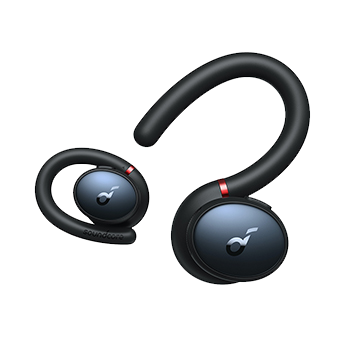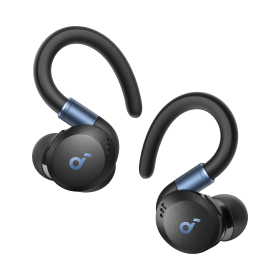Is Noise Cancelling Bad for Your Ears? Safety & Tips Revealed
Noise-cancelling headphones, including the innovative ANC open earbuds, have become increasingly popular for their ability to block out unwanted sounds, creating a quieter and more focused listening experience. They are especially useful in noisy environments, helping to reduce stress and improve concentration. However, as we increasingly rely on this technology, a crucial question looms: Is Noise Cancelling Bad for Your Ears? Like any technology, noise cancelling headphones come with their own set of disadvantages. Some people worry that using them might be bad for our ears or hearing health.
In this article, we'll dive into the truth behind these concerns. We'll look at how noise-cancelling technology works, its potential effects on our ears, and tips for using these headphones safely.
How Does Noise Cancelling Work?
There are two main types of noise-cancelling: active and passive.
- Passive noise-cancelling utilizes the physical design and materials of headphones to create a barrier that reduces ambient noise. This method, similar to earplugs, involves thick padding and tightly sealed earcups to block external sounds, effectively isolating the listener's ears from the surrounding environment, enhancing audio clarity without the need for electronic intervention.
- Active noise-cancelling technology works by using tiny microphones built into the headphones. These microphones listen to the sounds around you. Then, the headphones create a new sound that is the exact opposite of the noise. This new sound is called "anti-noise." When the anti-noise mixes with the original noise, they cancel each other out. This process is called "destructive interference." It's like when two waves in the ocean crash into each other and flatten out. The result is a much quieter environment, allowing you to hear your music or silence more clearly.You can read more about How Does Active Noise Cancelling Work
How Does Open Earbuds Noise Cancelling Work?
Open ear ANC technology, like that in the Aerofits 2 Pro, combines the benefits of noise cancellation with environmental awareness. The "Open-Ear Form" of these earbuds ensures that you can enjoy your music while staying connected to the world around you. The ANC feature in open ear designs works by minimizing external noise without compromising your awareness of nearby sounds, which is vital for safety in public spaces.
Open Ear ANC Benefits
Open Ear ANC earbuds combine the benefits of Active Noise Cancelling (ANC) technology with an open design, offering a unique listening experience that adapts to various environments.
- ANC Mode: Provides effective noise cancellation, allowing for a quieter, more immersive experience. This is particularly beneficial in noisy environments like crowded public spaces or during travel. It reduces unwanted background noise, helping you focus on your music or content.
- Open-Ear Mode: Features an open design that maintains awareness of the sounds around you. This is crucial for safety, especially in public spaces like streets or while exercising outdoors, where it's important to hear environmental cues such as traffic or people around you. The open ear design also promotes comfort, preventing ear fatigue during long listening sessions.
By seamlessly switching between ANC and open-ear modes, users can enjoy the best of both worlds—enhanced audio clarity when needed, and a safer, more comfortable listening experience in environments where awareness is essential.Learn more about the benefits of Open Ear Earbuds.
Aerofits 2 Pro: Advanced ANC and Open-Ear Flexibility
The Aerofits 2 Pro earbuds take the concept of open ear ANC to the next level with their innovative dual-form design, offering both ANC and Open-Ear modes for a customizable listening experience. Whether you need privacy and immersion or situational awareness and comfort, these earbuds adapt seamlessly to your needs.
- ANC Form: Provides powerful noise cancellation, ideal for noisy environments like subways, busy streets, or office settings. This mode ensures clarity in your audio without distraction from the surrounding noise.
- Open-Ear Form: The open design ensures you stay connected to the environment around you, making it perfect for outdoor activities or when safety is a priority. You can enjoy your music while being aware of traffic, conversations, or other important sounds around you.
- Comfort and Fit: The Aerofits 2 Prois designed for all-day comfort with its adjustable ear hook and breathable materials, preventing discomfort and ear fatigue. With a snug, secure fit, these earbuds ensure you can enjoy your audio for extended periods without feeling any pressure.
- Adaptive ANC: This feature automatically adjusts to reduce background noise based on your environment, whether you’re in a busy subway or a quiet office, giving you optimal listening experiences in any scenario.
- Long Battery Life: Enjoy up to 7 hours of playtime with ANC, and 34 hours with the case. The fast charging feature (10 minutes for 3.5 hours) ensures you’re never without your favorite tunes.
- Water and Sweat Resistance: With an IP55 rating, these earbuds are resistant to water and sweat, making them ideal for workouts or outdoor adventures.
The Aerofits 2 Pro is an excellent choice for anyone seeking versatile, high-performance earbuds with the best of both ANC and open-ear technologies.

Is Noise Cancellation Bad For Your Ears?
Noise cancelling headphones itself is not bad for your ears. However, improper use of noise-cancelling headphones can lead to potential hearing risks.
Noise cancellation technology, such as Active Noise Cancelling (ANC), works by reducing unwanted ambient noise, not by increasing the volume of what you're listening to. The risk to your ears comes from listening to content at high volumes for prolonged periods, not the noise cancellation itself.
Practices That Lead to Risk
- High Volume Listening: Regularly listening to music or any audio at high volumes can damage the delicate structures inside your ears over time, leading to hearing loss.
- Extended Usage: Wearing headphones for too long without breaks increases the risk of hearing damage, as your ears are exposed to continuous sound.
- Ignoring Early Signs of Hearing Loss: Not paying attention to symptoms like ringing in the ears after headphone use could lead to worsening conditions.
- Lack of Volume Control: Failing to use built-in volume limiting features on devices encourages listening at levels that may be harmful over time.
While noise cancelling headphones can significantly enhance listening experiences by reducing background noise, it's essential to use them responsibly to avoid potential harm to your hearing.
Safety Concerns Involving Noise-Canceling Headphones
When it comes to safety, there are a few concerns to consider with noise canceling headphones.
One of the main issues is the potential for users to become unaware of their surroundings. This can be particularly dangerous in situations where being alert is important, such as when crossing streets or in public spaces.
Additionally, there is a misconception that because noise-canceling headphones reduce external noise, it's safe to listen to music at higher volumes. This is not the case, and exposure to loud sounds can still lead to hearing loss. Therefore, it's essential to use these headphones responsibly and remain aware of your environment.
Aerofits 2 Pro: Safety of Open-Ear and ANC Forms
The Aerofits 2 Pro offers a solution to these concerns with its dual-form design. It provides two modes: the ANC Form, which ensures privacy and minimizes external noise, and the Open-Ear Form, which allows users to stay aware of their environment while enjoying music. This makes the Aerofits 2 Pro a great option for those who want to benefit from noise cancellation while also remaining mindful of their surroundings.
How to Prevent Hearing Damage When Using Noise-Cancelling Headphones?
To prevent hearing damage when using noise cancelling headphones, it's important to follow some best practices.
Tips 1: Set Safe Volume Limits
To protect your hearing, it's important to keep the volume at a safe level. A good rule of thumb is to set your volume at no more than 60% of the maximum. This helps prevent exposure to harmful noise levels that can lead to hearing loss.
Tips 2: Take Regular Breaks
Listening to audio for extended periods can strain your ears. Make sure to take breaks every hour or so to give your ears a rest. This can reduce the risk of hearing fatigue and long-term damage.
Tips 3: Use Noise-Cancelling Features Wisely
Take advantage of the noise-cancelling feature to keep the volume lower. By reducing background noise, you can listen to your audio clearly without needing to turn up the volume.
Tips 4: Monitor Listening Habits
Be mindful of how long and how often you use your headphones. Using apps or features that track your listening habits can help you stay aware of your exposure to sound and make adjustments as needed.
Tips 5: Choose the Right Fit
Ensure your headphones fit well and provide a good seal. This can enhance the effectiveness of noise cancellation, allowing you to enjoy your audio at lower volumes.
Tips 6: Check for Signs of Hearing Loss
Pay attention to any signs of hearing loss, such as ringing in the ears or difficulty understanding speech. If you notice any changes, it's important to seek advice from a hearing professional.
Adhering to these guidelines not only safeguards your hearing but also enhances your listening experience. For those looking to invest in a pair of headphones that facilitate responsible listening while offering superior noise cancellation, the soundcore ANC Headphones emerge as an ideal choice. Their advanced features are designed with your hearing health in mind, ensuring a safer and more enjoyable audio experience.
FAQs
Here are some frequently asked questions to help you understand their safe usage.
Is It Bad to Wear Noise-Cancelling Headphones All Day?
No, it's not inherently bad to wear noise cancelling headphones all day, but there are some considerations to keep in mind. Prolonged use, especially at high volumes, can potentially lead to hearing fatigue or even damage. It's crucial to take regular breaks and keep the volume at a safe level. Additionally, wearing headphones for extended periods can cause discomfort or pressure on the ears, so it's essential to choose comfortable headphones and adjust their fit as needed.
Are Noise Cancelling Headphones Safe?
Yes, noise cancelling headphones are generally safe when used properly. They are designed to reduce ambient noise, which can help protect your hearing by allowing you to listen to audio at lower volumes. However, it's essential to be aware of your surroundings, especially in situations where hearing external sounds is important for safety. Also, ensure that the volume of your audio is kept at a safe level to prevent hearing damage.
Is It Ok to Sleep with Noise-Canceling Headphones?
It’s generally safe to sleep with noise-canceling headphones, but it depends on comfort and personal preference. Over-ear headphones might be more comfortable than in-ear models. However, prolonged use could lead to discomfort or ear pressure, so it’s advisable to take breaks and choose special headphones designed for sleep like the Sleep A30 for enhanced comfort.
Is active noise cancelling bad for your ears?
Not at all. Active noise canceling (ANC) technology, such as that found in the soundcore Space One headphones, reduces unwanted ambient sounds using active noise control. This feature is not harmful to your ears; in fact, it can make listening at lower volumes possible, which is beneficial for ear health.
Conclusion
The question “Is noise cancelling bad for your ears?” can be answered with a resounding no, provided that noise-cancelling headphones are used responsibly. Active noise cancelling (ANC) technology offers a way to reduce background noise and enjoy a more immersive listening experience without cranking up the volume to potentially dangerous levels. However, it's essential to use this technology wisely, taking regular breaks and choosing comfortable noise-cancelling headphones or earbuds that suit your needs.
The Aerofits 2 Pro, with its advanced ANC and Open-Ear options, is a perfect example of a product that combines safety and performance. By following best practices and investing in high-quality products, you can enjoy the benefits of noise cancellation without compromising your hearing health. Consider the Aerofits 2 Pro ANC open earbuds for a safer, more comfortable listening experience.





























































